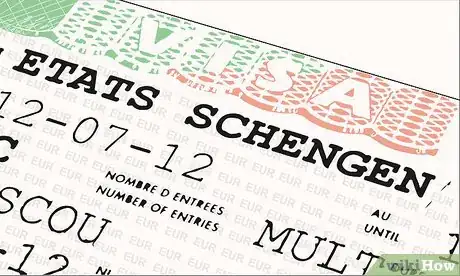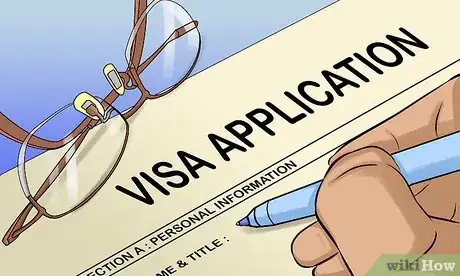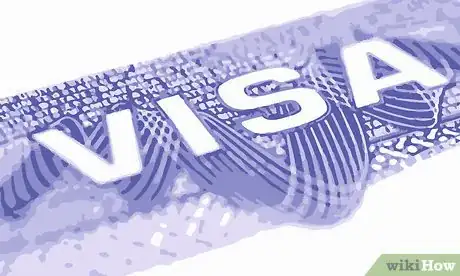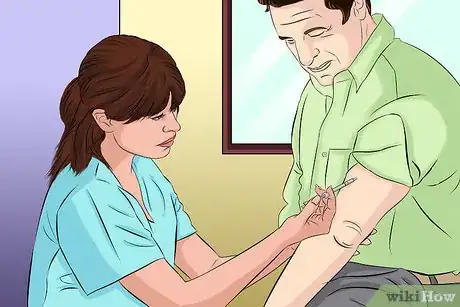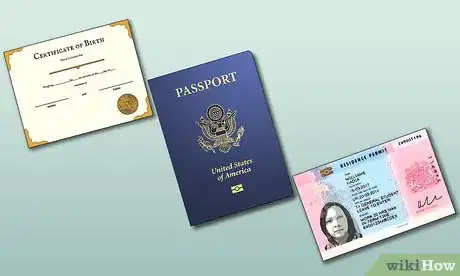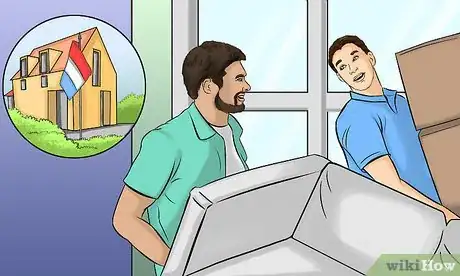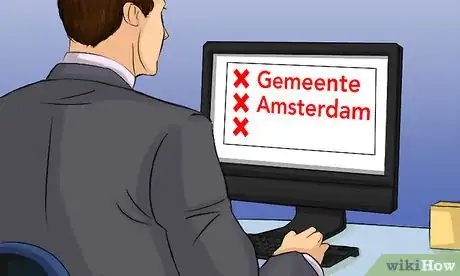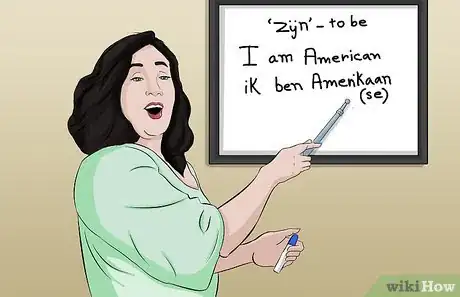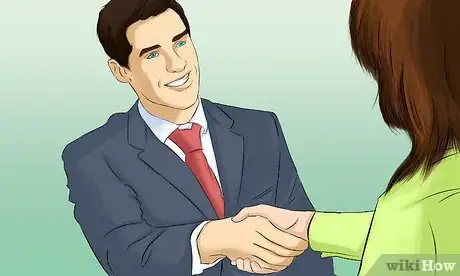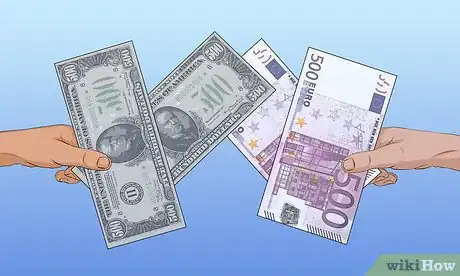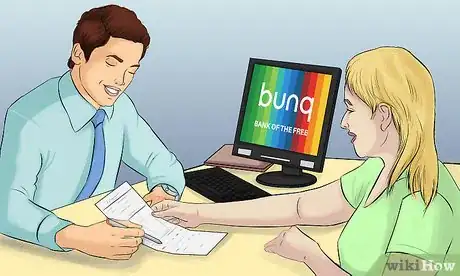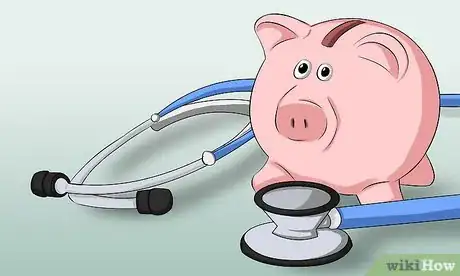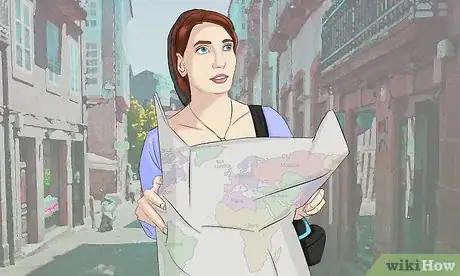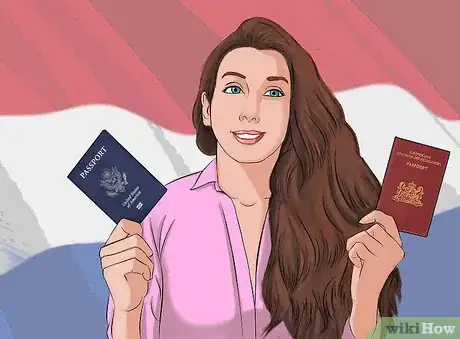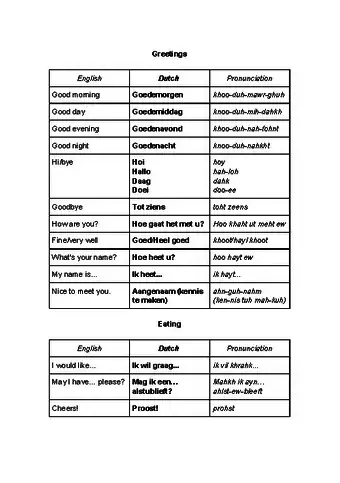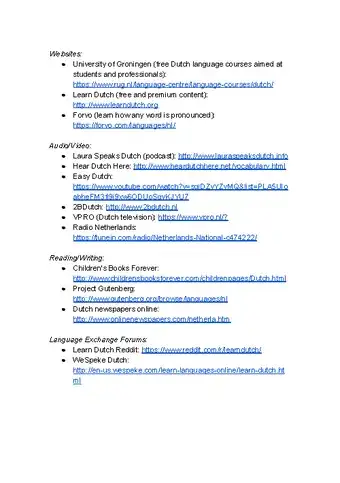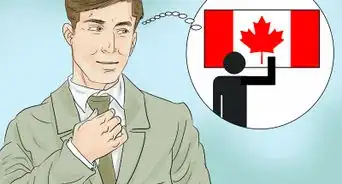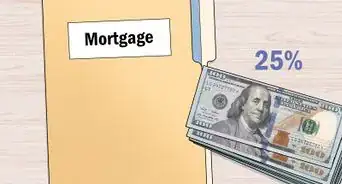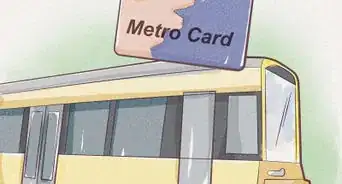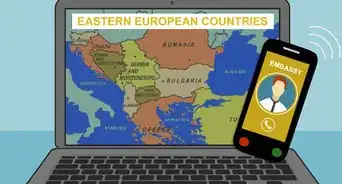This article was co-authored by Deirdre Nero. Deirdre D. Nero is an Immigration & Nationality Law Attorney and the Founder of NERO Immigration Law, P.L., based in Miami, Florida. With nearly 20 years of experience, she specializes in business-based immigration, family-based immigration, and naturalization. She earned her law degree from the University of Miami School of Law and her BA from Florida State University. In 2014, Deirdre won Business Immigration Lawyer of the Year–Florida in the Global Mobility & Immigration Awards given by Acquisition International. She’s also earned an AV Preeminent rating from Martindale-Hubbell, which annually rates lawyers on their abilities and ethics. Additionally, South Florida Legal Guide named her a Top Lawyer in South Florida several years in a row. In 2019, Deirdre was honored to receive the Outstanding Entrepreneur Award at the 2019 AXA Businesswoman of the Year Awards by the Coral Gables Chamber of Commerce and the Merrick in the Making Award by the Coral Gables Chamber of Commerce. In 2019 and 2021, Deirdre was named to Florida Trend Magazine’s Legal Elite.
There are 11 references cited in this article, which can be found at the bottom of the page.
wikiHow marks an article as reader-approved once it receives enough positive feedback. In this case, 100% of readers who voted found the article helpful, earning it our reader-approved status.
This article has been viewed 415,433 times.
Moving to the Netherlands is an exciting prospect! You can take comfort in the fact that you’ll be among some of the friendliest, tallest, beer loving people in the world. One of the things many people really love about the Netherlands is the amazing coffee culture, and since it is a flat country, it’s also really easy to get around by foot or on a bike. So many things to love![1] If you are planning a move to this beautiful country, you should bring appropriate documentation and plan ahead for employment and housing.[2]
Steps
Getting a Visa
-
1Don’t worry about getting a visa if you are moving from within the EU. The Netherlands is part of the Schengen area of Europe, which includes a number of countries with a common visa and no border controls. You don’t need to worry about getting a visa if you are a citizen of one of the countries in the European Union, European Economic Area or Switzerland.[3]
- However, if you are from Croatia, a new EU member, you will still need a visa.
- If you have two nationalities and passports, you may need a visa, depending on which passport you use to enter the country.
-
2Apply for a C-visa for periods of less than three months. If you want to move to the Netherlands for three months or less, you can just apply for a short-stay visa. You will be able to live in the Netherlands for up to 90 days within a six-month period.[4]
- The cost for a short stay visa is sixty euros.[5]
- As long as your employer has a work permit in your name, you can work with this type of visa.
- You cannot apply for a residence permit with this type of visa.
Advertisement -
3Apply for a long-term visa for periods of longer than three months. If you want to move to the Netherlands for longer than three months, you’ll need a long-term, MVV visa. You apply for the MVV visa at the same time as your residence permit. The process will be slightly different depending on where you are coming from. For the residence permit, you need to book an appointment with an office of the Immigration and Naturalisation Service (IND).
- If you are travelling from the UK, you can apply for a visa through the Ministry of Foreign Affairs, which has a Netherlands Visa Application Center.
- You don’t need a long-term visa if you are from the EU, USA, Canada, Japan, New Zealand, South Korea, Iceland, Liechtenstein, Monaco, Norway, Switzerland or Vatican City. However, you’ll still need a residence permit from the IND.
- To make an appointment with IND, call +31 88 0430 430. They are open Monday to Friday, 9am–5pm.
- To see the cost of various long term visas, visit the IND website.[6]
- You don’t need a visa if you are travelling from one of the European Union or European Economic Area member states or from Switzerland.
- Visit a Netherlands Embassy close to you to ask about specific visa requirements for your situation.
-
4Visit the doctor and receive any necessary vaccinations you need. Prior to your move, you should also do a check up and get any health certificates you may require.
- For instance, you should get routine vaccines like measles-mumps-rubella (MMR) vaccine, varicella vaccine and your flu shot.[7]
- If you are not travelling from the US, you may need Hepatitis A, B and other vaccines.
Registering with the Town Hall
-
1Bring the necessary documents from home. You will need official documents to register with the town hall, which is called the Gemeente. If your documents are not written in Dutch, English, French or German, you have to get an official translation. It makes sense to bring extra copies of important documents, such as your birth certificate and marriage certificate. Bring the following documents with you from home:[8]
- Valid passport (or personal identification).
- Residence permit, such as a sticker in your passport, ID card or letter from IND.
- Rental contract.
- Certified copy of your birth certificate.
- If applicable, you need your foreign marriage certificate, divorce certificate or registered partnership.
-
2Find an address to register at. You’ll need a rental contract or agreement to get your BSN or social security number, which means you need to find a place to live prior to registering with the Gemeente. When you search for a place to live, you need to ask the property owner if they allow registration at the address - some owners don’t allow registration because it increases their taxes.[9]
-
3Make an appointment to register at the town hall. You should book your appointment with the Gemeente (town hall) as soon as you arrive in the Netherlands. Ask them when the next available appointment is and then book a day and a time.[12]
- If you are moving to Amsterdam, you can call the Gemeente at 14020 255 29 09.
- If you are moving to Utrecht you can call 030 286 00 00.
- If you know the city you are moving to, you can see if they have online appointment booking. Find the website for the Gemeente at your final destination and book an appointment online.
Settling Down
-
1Learn the language. Although most people in the Netherlands speak English, you should learn the language. People will appreciate it if you make the effort to speak their language. Find a language class upon arrival or use language tapes. Dutch can be tricky to learn, but it is certainly worth the effort if you plan to move to the Netherlands.
-
2Get a job in the Netherlands. You should consider your employment prospects before moving to the Netherlands. Because most jobs require strong Dutch language skills and all of the restrictions around hiring people who are not citizens of the European Union, you should prepare yourself for a long job search.[13]
- If you are a scientist or a highly trained professional in a particular area, your employer may be able to sponsor you.
-
3Convert your currency into Euros. Remember, the more money that you bring, the better start that you will get in the Netherlands. Bear in mind that the Euro may be worth more or less than your own currency.
-
4Look for a bank with good online foreign language services. Because it is very difficult to pay for anything with foreign bank cards in the Netherlands, you should get yourself a Dutch bank account. Although there are a lot of banking options, few banks have good online English services.[14]
-
5Figure out how you'll be covered for health care. You are required to have health insurance in the Netherlands. You can get basic coverage for 109 euros.[15] You should make sure you either have a health insurance plan or travel insurance that includes it.
- If you fail to get insurance within three months, you’ll be fined for 386 euros.
- If you are not insured, you will receive basic medical aid but you can expect a high bill. However, every hospital has a fund for non-insured or people without papers, so you will never be denied urgent medical aid.
- The Netherlands has agreements on health insurance with the EU and EEA countries as well as Australia, Cape Verde Islands, Croatia, Morocco, Tunisia, Turkey, Kosovo, Montenegro, Serbia, Vojvodina, Bosnia-Herzegovina and The Republic of North Macedonia.[16]
-
6Brace yourself for culture shock. Things may take some getting used to, such as driving on another side of the road, or the temperature. However, try to laugh it off! These things will come in time.
-
7Meet new people. You should find new places to meet Dutch people, such as the local pub, gym or at school. Although the Dutch are known to be a direct and fairly extroverted lot, they generally do not invite you to their home unless you've made your way into their circle of close friends and family.
-
8Obtain citizenship after five years of residence. After living in the Netherlands for five years in a row, you can become a Dutch citizen. You will need to prove fluency in Dutch, adopt a name that can be easily pronounced in Dutch and renounce your other citizenship. You will need to apply through the IND and the process takes about a year.[18]
Printable Phrase Guides
Community Q&A
-
QuestionHow do I become a citizen of the Netherlands?
 Community AnswerTo become a Dutch citizen, you need to do something called "inburgeringscursus." During this course, you learn Dutch, and are taught about living and working in the Netherlands. When you are done with this course, you need to take a test. This test will need to be passed after three years of living in the Netherlands.
Community AnswerTo become a Dutch citizen, you need to do something called "inburgeringscursus." During this course, you learn Dutch, and are taught about living and working in the Netherlands. When you are done with this course, you need to take a test. This test will need to be passed after three years of living in the Netherlands. -
QuestionDo you have any suggestions for moving to work in Holland if I have a small advanced level certificate?
 EfficientspazCommunity AnswerBefore you move, make sure you know there are job options and you have a house/apartment to stay in.
EfficientspazCommunity AnswerBefore you move, make sure you know there are job options and you have a house/apartment to stay in. -
QuestionHow do I retire to the Netherlands from the US?
 Tom De BackerTop AnswererYou need to apply for a visa. Contact the Dutch embassy in the US for more information.
Tom De BackerTop AnswererYou need to apply for a visa. Contact the Dutch embassy in the US for more information.
Warnings
- It is easy to get lost in a big city. Be especially careful in places such as Amsterdam, where there are some parts that you may want to avoid.⧼thumbs_response⧽
- Dutch people are very open minded and direct. They might criticize politics in your home country. Do not be offended, but engage and educate.⧼thumbs_response⧽
- Many people end up wanting to go home, and then get themselves wrapped in huge debts.⧼thumbs_response⧽
- Don't feel rushed into making the decision to move to the Netherlands.⧼thumbs_response⧽
- You may get insulted because you are a foreigner.⧼thumbs_response⧽
Things You'll Need
- Passport and legal documents
- Money
- A new home
- Phone (optional, for contact with loved one's)
- Tickets for transport (should you need any)
- Furniture (if you are bringing your furniture over)
- Map
- A car (or a bike)
Expert Interview

Thanks for reading our article! If you'd like to learn more about moving to Europe, check out our in-depth interview with Deirdre Nero.
References
- ↑ http://awesomeamsterdam.com/10-fun-facts-about-the-netherlands/
- ↑ https://dutchreview.com/featured/moving-to-the-netherlands/
- ↑ http://www.expatica.com/nl/visas-and-permits/Moving-to-the-Netherlands-Guide-to-Dutch-visas-and-permits_101934.html
- ↑ http://www.expatica.com/nl/visas-and-permits/Moving-to-the-Netherlands-Guide-to-Dutch-visas-and-permits_101934.html
- ↑ https://ind.nl/en/Pages/Costs.aspx
- ↑ https://ind.nl/en/Pages/Costs.aspx
- ↑ https://wwwnc.cdc.gov/travel/destinations/traveler/none/netherlands
- ↑ http://www.iamexpat.nl/expat-page/official-issues/essentials/registration
- ↑ http://www.iamexpat.nl/expat-page/official-issues/essentials/registration
- ↑ https://dutchreview.com/featured/moving-to-the-netherlands/
- ↑ http://annaeverywhere.com/what-to-expect-when-youre-moving-to-the-netherlands/
- ↑ https://dutchreview.com/featured/moving-to-the-netherlands/
- ↑ https://www.expatinfodesk.com/expat-guide/deciding-on-the-right-country/top-expatriate-destinations/netherlands/
- ↑ https://dutchreview.com/featured/moving-to-the-netherlands/
- ↑ https://www.zorgverzekeringslijn.nl/english/
- ↑ http://us.holland.com/e/8150/Health-care.php
- ↑ http://www.dutchgrammar.com/holland/people.html
- ↑ http://www.expatica.com/nl/visas-and-permits/Moving-to-the-Netherlands-Guide-to-Dutch-visas-and-permits_101934.html
About This Article
To move to the Netherlands, apply for a C-visa if you live outside of the EU and want to stay there for 3 months or less. For a long-term move more than 3 months, apply for a residence permit and a long-term visa if necessary for your country. Once you receive your permit, take your passport, copy of your birth certificate, residence permit, rental contract, and marriage certificate to the Gemeente, which is the Town Hall. When you're finding a place to live, ask the property manager if they allow you to register the address with the Town Hall, which can increase their taxes. For tips on settling down in the Netherlands and learning Dutch, read on!
